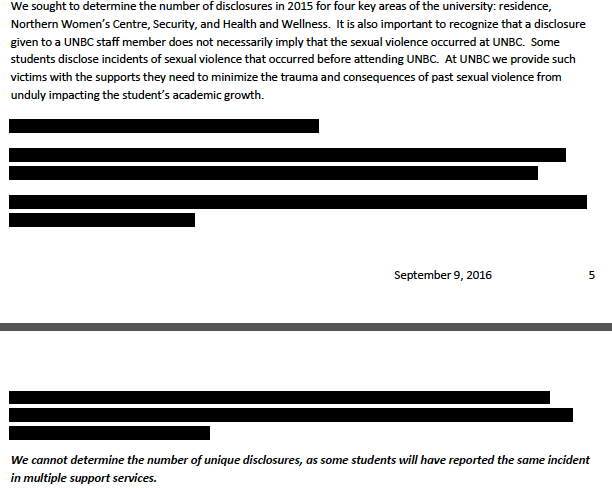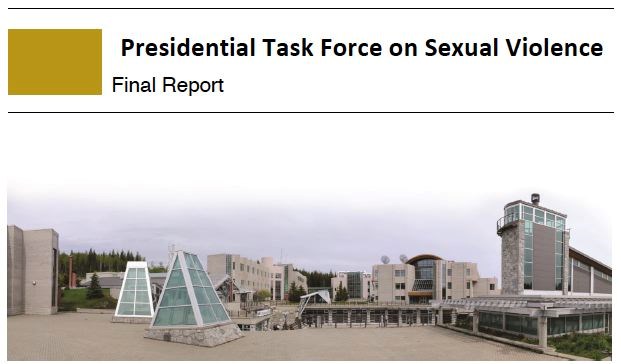A University of Northern B.C. report obtained through a Freedom of Information request reveals barriers to reporting sexual violence, a lack of available data and gaps in existing policy that a task force was formed to address.
When the Presidential Task Force on Sexual Violence launched in spring 2014, it had "significant concern that cases were being managed through a patchwork of individual responses," said the Sept. 9 report, of which one section discussing the number of disclosures was redacted.
"The effect of this approach was highly idiosyncratic and non-coordinated approach, which may likely have increased the time students needed for healing and recovery," according to the 11-page document, which expands on the 13 recommendations released in late September.
At the time, UNBC declined to release the report, citing the sensitive nature of its subject. The recommendations - for more training, better reporting mechanisms and clear policy - are discussed more broadly in the report, with reasoning and some insight into campus systems.
The first term of reference tasks the group with determining "the occurrence of sexual violence" on its campus. The section that discusses the number of disclosures last year was blacked out.

The Freedom of Information and Privacy Act permits redactions in certain cases and UNBC said it removed that section - and two others in supporting emails - citing three reasons: a third party will be exposed unfairly to financial or other harm, personal information has been supplied in confidence and that information is likely to be inaccurate or unreliable.
"The size of the data is too small for us to release it without the risk of people being identified," said Barb Daigle, UNBC associate vice president, also citing the small campus population, which this year sits at almost 3,300. "Our first and primary focus needs to be to protect the confidentially and make sure we have a trusting environment so people will disclose."
The committee consulted four support services - the residence, Northern Women's Centre, security and health and wellness - and asked them to provide statistics, Daigle said. It wasn't clear if the numbers that emerged referred to on- or off-campus incidents, or if the same incident had been disclosed to another support service.
"We didn't validate them. We didn't double check them. There's no institutional rigour and so they're just numbers that could cause more problems," said Daigle, adding the task force didn't reach out to all potential channels - like human resources - so the redacted data could represent an underreporting of available information.
The document also clarifies a key difference between a report - a formal process where an allegation of sexual violence is investigated - and disclosure - more informal and typically done through support.
"Publicizing the numbers could reduce the community's trust in the confidentiality of the various reporting channels, or even re-traumatize those who have been affected."
Daigle couldn't discuss what was under the black ink - "anecdotal at best" - though she referenced "a couple of actual reported cases."
The only publicly available UNBC numbers are from a CBC story last year that looked at campus assaults across Canada between 2009 and 2013.
UNBC had one reported assault in the last five years.
UNBC's current policies create a vacuum of information for students who want to look into their options.
The existing student conduct statement of principle is an overarching policy and its generality "does not allow for students to easily search UNBC policies and identify how UNBC would respond specifically to cases of sexual violence," the report said.
And, because the words "sexual violence" are never referenced "many students do not know where to begin to seek formal confidential reviews of their situation."
"(Students) have also been known to inquire if they can be moved to a different course or course section in order to reduce re-victimization as a result of being in the same class as a perpetrator," the report said.
The report did not detail any specific cases but it and Daigle are clear that any information represents an under-reporting of misconduct or violence.
"We know the numbers generated right now - even if they aren't accurate - don't reflect the actual numbers of students affected and why is that?" she said.
The new steering committee will work on answering that question and, more immediately, address a provincial requirement that every university to develop a stand-alone sexual violence policy by mid-May 2017.
Supporting documents show seven meetings between April and October alongside ongoing emails about the draft report. The task force referred to guidelines prepared by the Ministry of Advanced Education as well as the American College Health Association to develop its recommendations.
Implementing the 13 recommendations will take extensive consultation with students, Daigle said, and require a campus-specific approach beyond the provincial mandate.
"Policies alone don't change the culture," said Daigle, adding discussions last week with the new committee focussed on building trust and confidence in the campus approach.
"This is a big issue ... We have to come up with a solution for UNBC."


